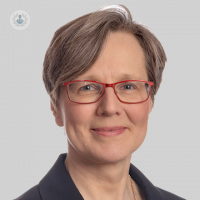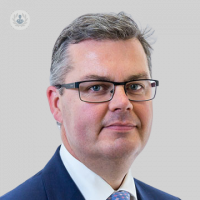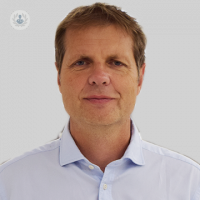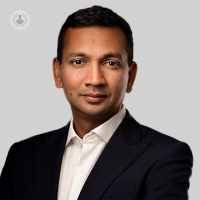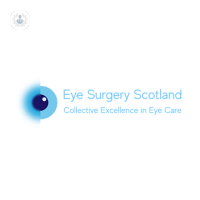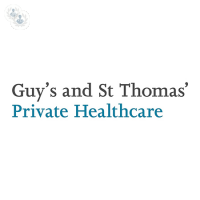What is paediatric ophthalmology?
A children's eye doctor, or paediatric ophthalmologist, diagnoses, prevents, and treats diseases that affect children's eyes and vision.
Good eye care is essential during childhood as many visual problems develop while the eyes are growing and may affect the child's future development.
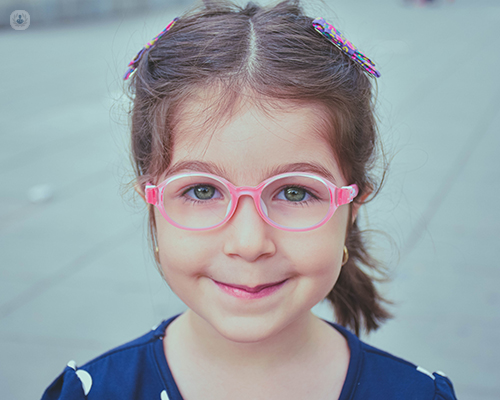
Conditions that are treated with children's ophthalmology
The most common conditions which affect eyesight during childhood are:
- Developmental disorders, which are often diagnosed shortly after birth or within the first year of life;
- Refractive/optical problems (short-sightedness, long-sightedness, astigmatism);
- Short-sightedness (myopia) is becoming more common in children and young people, and over the past two years, new treatments have become available to slow down the worsening of myopia;
- Amblyopia (commonly known as lazy eye);
- Strabismus;
- Inflammation on the surface of or inside the eye, including allergic eye disease;
- Infections of the conjunctiva, the transparent membrane which covers the white part of the eye and the inside of the eyelids;
- Eyelid lesions.
A child's learning and academic performance can be affected by undiagnosed and untreated vision problems. Eye conditions can also affect children's quality of life by limiting their ability to take part in age-appropriate activities.
When to see a paediatric ophthalmologist
All children have a basic eye check at birth to make sure there is no developmental defect such as cataract or retinoblastoma. Most children then have a basic vision check at the age of 4 to 5 years, as part of the school vision screening programme.
If you have any concerns about your child's eyes or vision, you should arrange a sight test by your local optometrist. Children under the age of 5-6 years may require a specialist assessment by a paediatric ophthalmologist.
11-13-2012 12-02-2024Paediatric ophthalmology
Dr Annegret Dahlmann-Noor - Ophthalmology
Created on: 11-13-2012
Updated on: 12-02-2024
Edited by: Karolyn Judge
What is paediatric ophthalmology?
A children's eye doctor, or paediatric ophthalmologist, diagnoses, prevents, and treats diseases that affect children's eyes and vision.
Good eye care is essential during childhood as many visual problems develop while the eyes are growing and may affect the child's future development.

Conditions that are treated with children's ophthalmology
The most common conditions which affect eyesight during childhood are:
- Developmental disorders, which are often diagnosed shortly after birth or within the first year of life;
- Refractive/optical problems (short-sightedness, long-sightedness, astigmatism);
- Short-sightedness (myopia) is becoming more common in children and young people, and over the past two years, new treatments have become available to slow down the worsening of myopia;
- Amblyopia (commonly known as lazy eye);
- Strabismus;
- Inflammation on the surface of or inside the eye, including allergic eye disease;
- Infections of the conjunctiva, the transparent membrane which covers the white part of the eye and the inside of the eyelids;
- Eyelid lesions.
A child's learning and academic performance can be affected by undiagnosed and untreated vision problems. Eye conditions can also affect children's quality of life by limiting their ability to take part in age-appropriate activities.
When to see a paediatric ophthalmologist
All children have a basic eye check at birth to make sure there is no developmental defect such as cataract or retinoblastoma. Most children then have a basic vision check at the age of 4 to 5 years, as part of the school vision screening programme.
If you have any concerns about your child's eyes or vision, you should arrange a sight test by your local optometrist. Children under the age of 5-6 years may require a specialist assessment by a paediatric ophthalmologist.
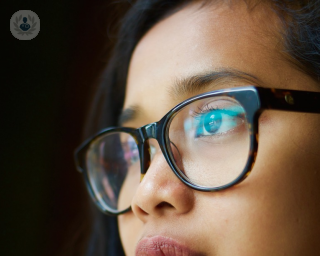

What should I do if my baby is rubbing their eyes constantly?
By Dr Annegret Dahlmann-Noor
2024-12-26
In our latest article, highly experienced, skilled, and trusted eye specialist for children and young people, Dr Annegret Dahlmann-Noor, provides the advice that parents may be seeking in relation to when they should seek medical help for their child's allergic eye disease. See more


All you should know about red eye in children
By Dr Annegret Dahlmann-Noor
2024-12-26
In our latest article, we learn what exactly causes red eye in children and what parents can do to help their children with red eye, as esteemed consultant ophthalmologist, Dr Annegret Dahlmann-Noor provides an all-you-need-to-know guide about red eye in children. See more


Should my child be doing eye exercises?
By Dr Annegret Dahlmann-Noor
2024-12-26
In our day-to-day activities, our eyes have to work so we can see. Sometimes, there is a problem or a weakness in our eye muscles and this can cause vision problems, even in children. In this article, consultant ophthalmologist and eye expert Dr Annegret Dahlmann-Noor has explained what eye muscle weaknesses cause difficulty seeing something close-up for children and what parents can do to help. See more
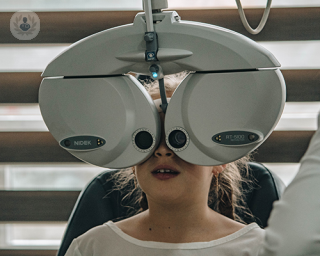

When should children have an eye test?
By Dr Annegret Dahlmann-Noor
2024-12-21
Having regular eye checks for your children is really important to ensure good eye health, as well as normal eye development. Dr Annegret Dahlmann-Noor, a top ophthalmologist, gives her advice on when parents should have their children's eyes tested. See more
Experts in Paediatric ophthalmology
-
Professor Chris Hammond
OphthalmologyExpert in:
- Strabismus (squint)
- Paediatric ophthalmology
- Cataract surgery
- Glaucoma
- Dry eye
-
Mr John Brookes
OphthalmologyExpert in:
- Glaucoma surgery
- Paediatric ophthalmology
- Cataract surgery
- Congenital glaucoma
- Cataracts
- Glaucoma
-
Mr Richard Bowman
OphthalmologyExpert in:
- Paediatric ophthalmology
- Strabismus (squint)
- Neuro-ophthalmology
- Nystagmus
- Cerebral visual impairment (CVI)
-
Dr Annegret Dahlmann-Noor
OphthalmologyExpert in:
- Amblyopia
- Blepharitis
- Conjunctivitis
- Myopia
- Paediatric ophthalmology
- Strabismus (squint)
-
Professor Saurabh Jain
OphthalmologyExpert in:
- Paediatric ophthalmology
- Strabismus (squint)
- Amblyopia
- Watery eyes
- Blepharitis
- Cataracts
- See all

Tunbridge Wells Eye Centre
Tunbridge Wells Eye Centre
7 Vale Ave, Tunbridge Wells TN1 1DJ
No existe teléfono en el centro.
By using the telephone number provided by TOP DOCTORS, you automatically agree to let us use your phone number for statistical and commercial purposes. For further information, read our Privacy Policy
Top Doctors

Eye Surgery Scotland
Eye Surgery Scotland
40 Colinton Road, EH10 5BT
No existe teléfono en el centro.
By using the telephone number provided by TOP DOCTORS, you automatically agree to let us use your phone number for statistical and commercial purposes. For further information, read our Privacy Policy
Top Doctors

Westminster Bridge Consulting Rooms at St Thomas' Hospital Private Healthcare.
Westminster Bridge Consulting Rooms at St Thomas' Hospital Private Healthcare.
Westminster Bridge Road, London
No existe teléfono en el centro.
By using the telephone number provided by TOP DOCTORS, you automatically agree to let us use your phone number for statistical and commercial purposes. For further information, read our Privacy Policy
Top Doctors
-
Tunbridge Wells Eye Centre
7 Vale Ave, Tunbridge Wells TN1 1DJ, Tunbridge WellsExpert in:
- Cataracts
- Oculoplastics surgery
- Laser eye surgery
- Refractive surgery
- Facial aesthetics
- Ophthalmology
-
Eye Surgery Scotland
40 Colinton Road, EH10 5BT, EdinburghExpert in:
- Cataracts
- Retina and Vitreous
- Lens replacement
-
Westminster Bridge Consulting Rooms at St Thomas' Hospital Private Healthcare.
Westminster Bridge Road, London , SE1 South Bank LondonExpert in:
- General Surgery
- Orthopaedic surgery
- Plastic surgery, reconstructive and aesthetics
- Endocrinology
- Obstetrics and Gynaecology
- Paediatrics
- See all
- Most viewed diseases, medical tests, and treatments
- Visual impairment
- Diabetic retinopathy
- Retina
- Visual stress (Meares-Irlen syndrome)
- Presbyopia
- Nystagmus
- Myopia
- Hyperopia (farsightedness)
- Eye examination
- Demodex
